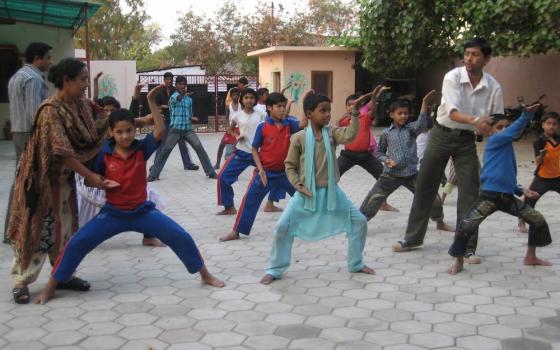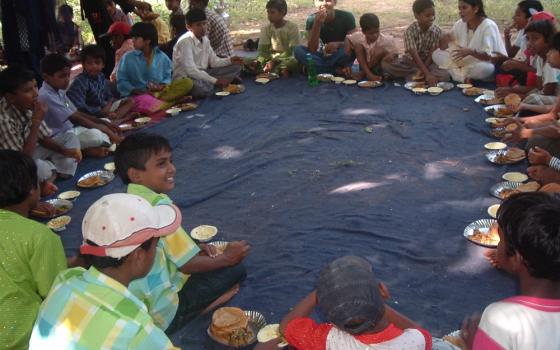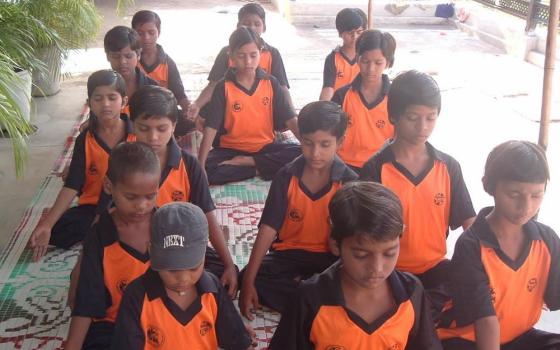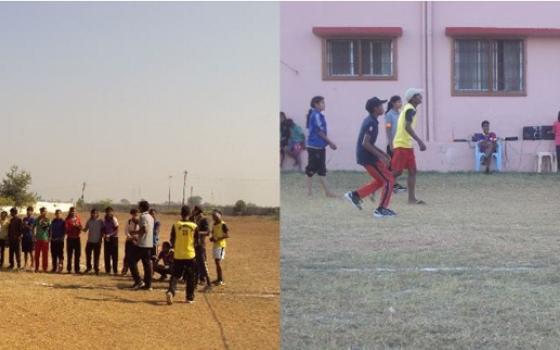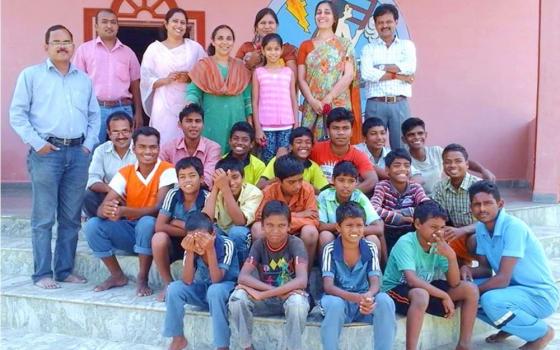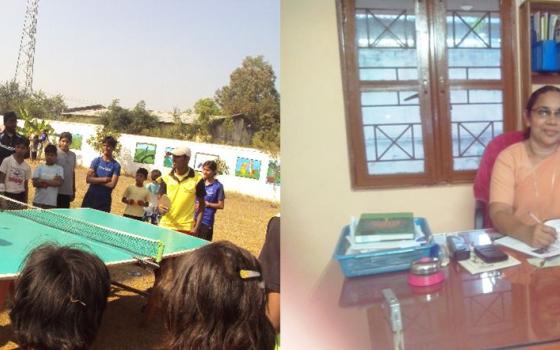Sr. Clara Animottil’s mission is to put smiles on the faces of children found homeless and loitering around railway platforms. When she first proposed this idea to her superiors, they ignored it.
But her indomitable resolve finally met with success. By spending hours every day with these children, she gradually brought about changes, not only in their lives, but also among police officers, railway security officials and others who misused those children.
Sr. Clara, (who uses only her first name), is a member of the congregation of the Sisters of St. Joseph of Chambery. She now heads Jeevodaya (Dawn of Life) Society, which is dedicated to the cause of orphaned railway platform children in Itarsi, a town in the central Indian state of Madhya Pradesh, some 560 miles (900 km) south of New Delhi. On an average, 160 trains pass through this junction daily.
She built her first section of Jeevodaya in 2000 on the outskirts of Itarsi Station with funds from Action Aid and a couple from the United Kingdom who worked with railway tourism. Currently, the center houses 34 orphaned girls rescued from railway platforms. The second center for boys went up in 2009, about 2 miles (3 km) away. It houses 42 boys. The society now has 36 full-time staff and six part-timers whose job is to go to the railway station and rescue orphans they find. They also reunite children who have left their families for various reasons. On average 400 such children are reunited with their families each year.
Sr. Clara stays with two other sisters of her congregation in a separate modest accommodation in the girls camp. She shared with Global Sisters Report about her life and mission.
What prompted you to take up this mission?
I was a frequent visitor to the railway station in Itarsi as a junior sister to meet our sisters who passed through the station. Every time a train stopped at the platform, these children rushed to collect used water bottles, sell tea, cigarettes and other things to the passengers. I found them living in highly unhygienic conditions, and it pained me and I wanted to really do something for them.
My desire became so strong in 1991 when I saw a passenger verbally abusing an orphan for mistakenly touching his body. The boy was very shabby and the man was furious. Even other passengers showed no sympathy for the child.
After returning from the platform, the child’s face began haunting me. I sat before the Blessed Sacrament and asked the Lord why those children were left with no one to care. Why they were not given their rights. I wanted to do something but felt helpless as I was teaching in our school. I subsequently, discussed the idea of starting something for them with my superiors, who laughed at me and ignored the suggestion.
Then how did you manage to start it?
As I continued to reflect over it and prayed to God for showing me some way, I got an opportunity to do a master’s degree in social work. During the course, I did a dissertation on “Psychosocial Development of Platform Children,” a topic none had opted for. This gave me enough insight into the problems of railway street children as I spent time with them on the platforms of Delhi and Mumbai with the help of Salesian priests.
I completed the study in 1998 and was planning to move ahead with the mission, but to my shock I was appointed assistant director of social work in Indore diocese against my will.
Bowing to pressure and the vow of obedience I had taken, I took up the job and continued for a year in that post. Then I quit it, against the will of the then bishop, the late George Anathil, and obviously, the superiors.
I later returned to Itarsi to pursue my dream.
Did your superiors allow you to go ahead with your dream?
Obviously, they were disappointed. But they neither stopped me nor gave me any appointment allowing me to spend time in prayer to decide about my future course of action. I took it as an opportunity and started to visit the railway station. I used to leave the convent after morning Mass and breakfast and spent time until 3 or 4 in the evening on the platforms interacting with [the children].
Since you were an outsider, did they accept you readily?
No. Initially they looked at me with suspicion. However, when I began to show interest in them, they gradually began to share their lives and opened up before me. Simultaneously, I also interacted with railway authorities, who initially thought it was madness and suggested that I spend time on something worthwhile rather than wasting it on those children, as they would never improve.
Then, how did you manage?
After interacting with the children, I found that they used to earn a decent amount from collecting used water bottles, selling tea, cigarettes, stealing, pickpocketing and robbery, among other things.
I helped them to save their money and open bank accounts with my address. Besides this, I also taught them English, songs and hygiene. Most were drug addicts, and I encouraged them to quit. As our friendship grew, they provided me tea and other snacks, which I readily accepted.
Didn’t you face challenges from anyone?
Some men on the platform who used to exploit these children soon became friendly and offered to help. But gradually, I found their intention was not to help me or my cause, but to become friendly with me to use me. They thought I was a woman of easy virtue and invited me to join them for joy rides or visit places.
But soon they realized that I was a different woman, and they left me without further harassment. By then I had established a good rapport with some senior railway officials who were very helpful to me. Meanwhile, railway officials also allotted me a room with basic amenities within the station premises that gave me a major boost.
When I began to learn more from the children, I found it was not just boys but many orphan girls I was not finding there on the platforms.
Why didn’t you find the girls? Where were they?
They did not go anywhere but were in the custody of senior boys who did not allow them to come to the platforms. The boys used to sexually exploit them. The girls’ plight was quite pathetic. Each girl would have to stay with one boy; otherwise many other boys would exploit them. Since the girls were afraid of such abuse, they used to accept one boy as their husband and stayed with him. Even then, multiple partners exploited them in many cases.
Similarly, if a boy goes to jail, his girl would have to stay with another boy for protection. Such arrangements led to fights among them, especially when the old boy came back from jail.
Besides the boys’ abusing them, the girls were also sexually exploited by lower-grade security staff and other anti-social elements. The officials, especially the Government Railway Police and Railway Protection Force, also used them to do their household chores without paying them.
How did you deal with such a situation? They must have not taken it kindly that you were saving the girls from their clutches?
You are right. It was not easy to rescue the girls. Once, I rescued a 10-year-old girl and the boy who had kept her as his wife threatened to kill me with a knife and demanded her back.
We somehow managed to hand him over to the police. Surprisingly, the police supported him even though he was put behind bars under pressure. The police were so annoyed with me for getting the boy booked that they even made me clean the lockup cell in the police station after the boy had defecated in it. Even though it was not my job, I did it for the sake of Christ’s unending love and to carry on with the mission of saving railway destitute.
Didn’t you feel like quitting?
No. If Jesus could embrace crucifixion for us, it was a very small thing. Obviously, I felt very bad. The incident turned positive for us. When higher officials came to know about it, they immediately took action against the errant police officials.
So your job became easy?
Not exactly. It has always been a challenge.
There is a general trend of accusing Christians of converting Hindus to Christianity under the pretext of carrying out charitable services. Did you face such an accusation?
Oh sure. I saved a boy from the custody of a fake sadhu [Hindu religious man] who used to exploit him sexually and made him work for him. The sadhu was so offended that he complained to the state chief minister’s office and other officials that I was converting poor Hindu children to Christianity. The police carried out an investigation but could not succeed in falsely implicating me.
However, in another false case, I was booked and an arrest warrant was issued against me.
An arrest warrant? What for?
It was for the alleged case of a missing 7-year-old girl. The girl had gone with her mother, and I had informed the child welfare commissioner, following the rule. But the officials of the committee remained silent and cooked up a false case and got the arrest warrant issued against me.
What prompted them to do so was my refusal to pay them bribes for getting government funds for the welfare of these children. The officials wanted me to pay them 20 percent of the amount. I refused and declined to take the government help. This, in fact, annoyed them.
Did the police arrest you?
No they did not arrest me. When they came to know the reality, they pleaded with me to apply for a bail and said they would not oppose it. I refused and asked them why I should apply for bail for no fault of mine.
Were you not afraid to go to jail?
Not at all. Even if I was arrested and put behind bars, I was sure it would have helped further expose the problems being faced by the railway street children. But, anyway, the police did not arrest me and wrote to the department concerned to get the false complaint withdrawn. The higher officials too issued an order for withdrawal of the complaint. Now it is for the court to decide.
Why do so many children come to the railway platforms? Are they all orphans?
Not all of them are orphans. Some are orphans with no one to look after them. But there are also children who have parents. Some leave home on account of poverty, ill treatment from their family members, schoolteachers and others.
I found many children from well-to-do families on the platforms. They complained they never got care from their parents. In some cases children left home to visit cities or to watch films, but got lost on their way. We have sent all of them with parents back to their homes. Every year on average, 400 such children are reunited with their families.
Since I cannot cover all your experiences, can you explain how you live your consecrated life under these circumstances?
First of all, a consecrated life is not meant for oneself. God’s call is to live for others and, only when you realize it, can you live for others and find meaning in a consecrated life.
God’s call is to experience the joy of life. You will experience it only in giving. If your concentration is only in acquiring, you will never be able to experience the eternal joy of life. When I share my life with the downtrodden, I am part of the mission of God and thus experience his love and happiness.
What is your message to the consecrated?
Cooperate with the plan of God rather than focusing on one’s own plans, then God will do wonders through each consecrated person. Daily prayer and being with the Blessed Sacrament will help one to become closer to God and help know his will.
[Saji Thomas is a freelance journalist based in Bhopal, a central Indian city. He has worked for several mainstream newspapers such as The Times of India. This article appears as part of a collaboration between GSR and Matters India.]
